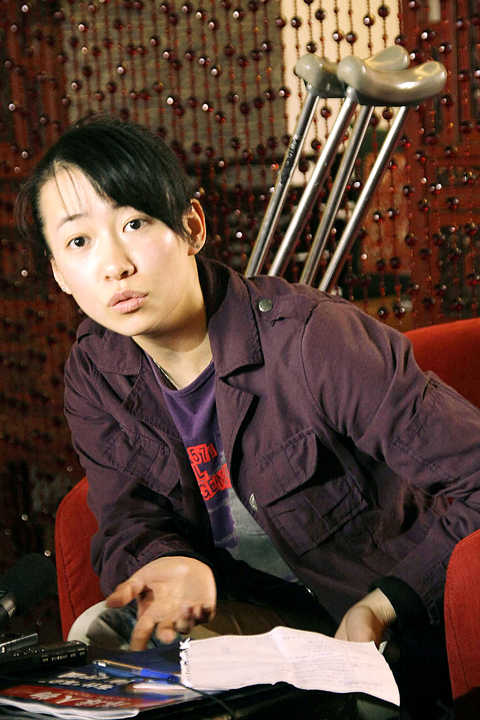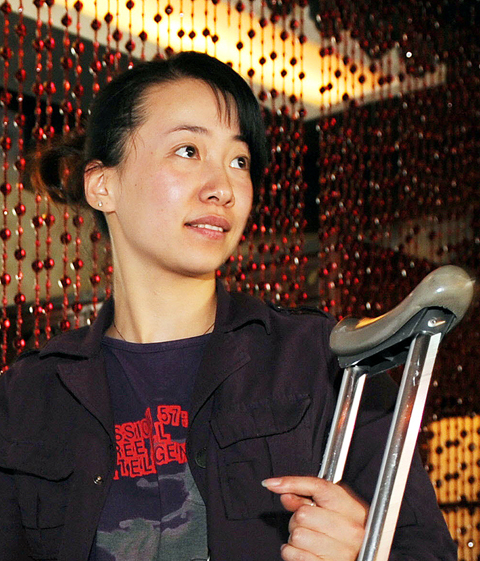She’s been portrayed as the “smiling angel in a wheelchair,’’ just the hero that China needed to rally national pride in the face of the embarrassment suffered over Olympic torch relay protests.
Jin Jing (金晶), a disabled, little-known fencing athlete, is now a household name here, riding a wave of sympathy and state media publicity after clinging stubbornly to the torch while a Tibet supporter tried to wrestle it away during the Olympic torch relay in Paris on April 7.
Ten days later, Jin seems overwhelmed by the publicity and said she still doesn’t understand why protesters wanted to take the torch. Until the incident in Paris, she said she had never heard that some Tibetans want independence from China.

PHOTO: AP
“I don’t pay attention to politics,’’ she said on Thursday in her first meeting with foreign reporters, a publicity agent from torch relay sponsor Lenovo Group by her side and whispering to her at least once about the Tibet-related questions.
Jin’s professed innocence is part of her appeal to Chinese, who have celebrated her ever since photos of her Paris struggle made the rounds online.
Disruptions of the torch relay in London, Paris and San Francisco shocked many Chinese, dimming a hoped-for moment of Olympic glory and inciting a fierce, besieged nationalism.

PHOTO: AFP
China has sought to use the Aug. 8 to Aug. 24 Olympics as a showcase to demonstrate it is an open, modern country. Protesters say China doesn’t deserve to host the Olympics because of its human rights record, its harsh rule in Tibet, and its friendly ties with Sudan.
Jin is now known as a defender of China’s dignity, embodying a national pride hurt by the protests that overwhelmed the torch relay and the criticisms of China’s crackdown in Tibet. While the first images of Jin on the Internet seemed to come from onlookers in Paris, state media soon began telling and retelling her story.
She joins a list of heroes promoted by the Communist government’s propaganda authorities, often at times of tension with the outside world. In 2001, after a US surveillance plane collided with a Chinese jet fighter off southern China, the Chinese pilot who died in the crash became a national hero. The Pentagon said the pilot’s reckless flying caused the crash.
While Jin is being praised, angrier Chinese have taken to seeking revenge. Users of the Internet, where a virulent nationalism thrives, have targeted those perceived as enemies with “human flesh search engines’’ — online campaigns that incite acts that are committed off-line.
This week, a Chinese student at Duke University was singled out for trying to negotiate peace between pro-Tibet and pro-China protesters on her campus.
Her photograph was taken at the face-off, the day the torch relay passed through San Francisco, and soon posted on a Web forum for Chinese students. The forum termed her a “traitor to your country’’ and gave her name, Chinese identification number and home address in China.
A photo posted online this week showed what was said to be a bucket of feces dumped on her parents’ doorstep in the port city of Qingdao.
The “human flesh search engine’’ also went after the man who tried to take the torch, mistakenly accusing a 44-year-old Tibetan living in Utah.
With his name, address, phone number and even a map of his neighborhood posted on some Chinese Web sites, Lobsang Gendun received so much harassment by phone and online that he moved into a hotel.
“I told them, ‘You’ve got the wrong person,’’’ said Gendun, a soft-spoken father of two.
Meanwhile, a lingering sense of insult over the confrontation in Paris has led to an online movement to boycott the French retail chain Carrefour. And the Chinese Foreign Ministry has joined critics of CNN, demanding that the network apologize for a commentator’s remarks that Chinese leaders were “thugs’’ and its products “junk.’’
In recent days, many Chinese users on MSN chat boards have attached heart icons with the word “CHINA’’ next to their profile names.
One analyst played down the impact of the impassioned rhetoric, which has been fanned by China’s government-controlled media. “The government loves that — allow it to dissipate online where it’s completely harmless,’’ said Paul French, chief China analyst for market intelligence provider Access Asia. “When it takes place on the street, I’ll be interested.’’
Jin previously was a member of Shanghai’s wheelchair fencing team who attracted little attention. The 28-year-old Paralympian’s right leg had been amputated when she was a child because of a malignant tumor.
The constant spotlight has been overwhelming, said spokespeople for Lenovo, the Chinese computer manufacturer that is a torch relay sponsor and chose Jin to participate in the relay. The Paralympics will be held in Beijing on Sept. 6 to Sept. 17, following the Olympics.
Jin left Thursday’s news conference on crutches, quickly.
During the 20-minute appearance, Jin avoided politics, although it dominated the reporters’ questions. Why was she attacked? She said she still does not know: “I hope you in the media can answer that for me.’’
She repeated the Chinese government’s position on the issue — “Tibet has always been a part of China’’ — and when asked if she had considered the Tibetans’ point of view, the Lenovo minder sitting next to her whispered sharply.
“Everyone has their own point of view,’’ Jin said. But she added, addressing the protesters, “Your actions are wrong.’’
The torch incident in Paris apparently hasn’t dampened Jin’s enthusiasm. A Lenovo spokeswoman said talks are under way about the possibility of the fencer carrying the Olympic torch again, this time when it comes through Shanghai.
When asked if she had a dream, Jin had a simple answer. “World peace,’’ she said with a smile.

April 28 to May 4 During the Japanese colonial era, a city’s “first” high school typically served Japanese students, while Taiwanese attended the “second” high school. Only in Taichung was this reversed. That’s because when Taichung First High School opened its doors on May 1, 1915 to serve Taiwanese students who were previously barred from secondary education, it was the only high school in town. Former principal Hideo Azukisawa threatened to quit when the government in 1922 attempted to transfer the “first” designation to a new local high school for Japanese students, leading to this unusual situation. Prior to the Taichung First

When the South Vietnamese capital of Saigon fell to the North Vietnamese forces 50 years ago this week, it prompted a mass exodus of some 2 million people — hundreds of thousands fleeing perilously on small boats across open water to escape the communist regime. Many ultimately settled in Southern California’s Orange County in an area now known as “Little Saigon,” not far from Marine Corps Base Camp Pendleton, where the first refugees were airlifted upon reaching the US. The diaspora now also has significant populations in Virginia, Texas and Washington state, as well as in countries including France and Australia.

On April 17, Chinese Nationalist Party (KMT) Chairman Eric Chu (朱立倫) launched a bold campaign to revive and revitalize the KMT base by calling for an impromptu rally at the Taipei prosecutor’s offices to protest recent arrests of KMT recall campaigners over allegations of forgery and fraud involving signatures of dead voters. The protest had no time to apply for permits and was illegal, but that played into the sense of opposition grievance at alleged weaponization of the judiciary by the Democratic Progressive Party (DPP) to “annihilate” the opposition parties. Blamed for faltering recall campaigns and faced with a KMT chair

Article 2 of the Additional Articles of the Constitution of the Republic of China (中華民國憲法增修條文) stipulates that upon a vote of no confidence in the premier, the president can dissolve the legislature within 10 days. If the legislature is dissolved, a new legislative election must be held within 60 days, and the legislators’ terms will then be reckoned from that election. Two weeks ago Taipei Mayor Chiang Wan-an (蔣萬安) of the Chinese Nationalist Party (KMT) proposed that the legislature hold a vote of no confidence in the premier and dare the president to dissolve the legislature. The legislature is currently controlled